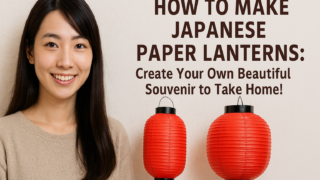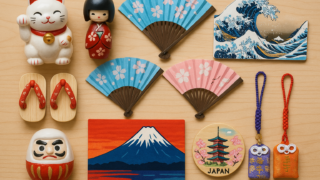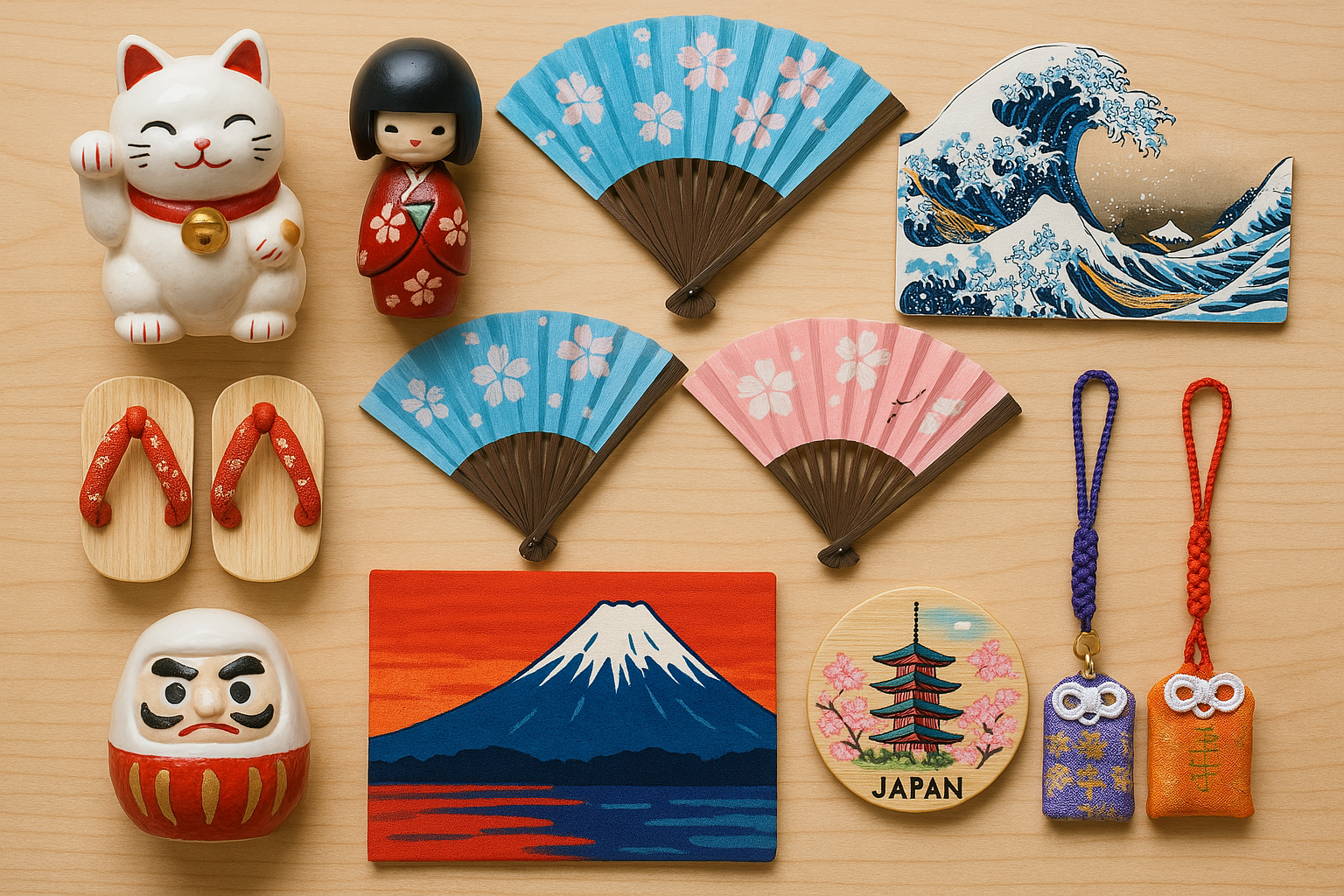Top 10 Traditional Japanese Souvenirs You Shouldn’t Miss in Asakusa: Must-Have Keepsakes for Your Tokyo Adventure
- Why Asakusa is the Ultimate Souvenir Destination
- 1. Sensu Fans: A Cool Souvenir with a Cultural Twist
- 2. Kokeshi Dolls: Traditional Wooden Crafts from Japan’s Past
- 3. Japanese Paper: A Touch of Elegance for Any Occasion
- 4. Geta: Traditional Japanese Wooden Sandals
- 5. Omamori: Japanese Charms for Protection
- 6. Tabi Socks: Traditional Footwear with a Modern Twist
- 7. Edo Kiriko: Elegant Cut Glassware from the Edo Period
Why Asakusa is the Ultimate Souvenir Destination
Asakusa is like the heart of Tokyo, full of history, charm, and, most importantly, a treasure trove of souvenirs! If you’re looking to bring a piece of Japan back with you, there’s no better place than this bustling, traditional district. From ancient temples to modern shopping streets, Asakusa offers a blend of old and new that perfectly represents Japan’s unique culture. Whether you’re after something simple or a little more intricate, you’ll find souvenirs here that are as rich in tradition as they are in beauty. Asakusa is like a giant souvenir shop, but with the added bonus of being surrounded by history and culture. Trust me, after you visit, you’ll feel like you’ve uncovered some hidden gems!
1. Sensu Fans: A Cool Souvenir with a Cultural Twist
What is a Sensu Fan?
Sensu fans are beautiful, foldable fans traditionally used in Japan during the summer to stay cool. Made of delicate paper and often adorned with intricate designs, these fans are not only practical but also highly collectible. The beauty of the sensu fan is that it’s a mix of function and art – like a portable piece of Japanese history that you can carry with you. Picture yourself walking through the streets of Asakusa, fan in hand, feeling like you’re part of an ancient ritual while beating the summer heat.
Why You Should Get One in Asakusa
Asakusa’s charm lies in its craftsmanship, and that’s especially true for its sensu fans. The shops around Senso-ji Temple offer beautifully crafted fans, each one telling a story. Whether it’s a classic floral design or a more contemporary style, you can find a fan to suit your taste. The best part? These fans don’t just make great souvenirs; they’re perfect for display in your home. Imagine how wonderful it would feel to showcase a traditional sensu fan, bringing a bit of Asakusa into your everyday life. Plus, they’re a conversation starter – everyone will ask, “Where did you get that beautiful fan?”
2. Kokeshi Dolls: Traditional Wooden Crafts from Japan’s Past
What are Kokeshi Dolls?
Kokeshi dolls are handcrafted wooden figures that originate from the Tohoku region of Japan. Typically featuring a simple, round head and a cylindrical body, these dolls are painted with vibrant, colorful designs. Though their look may seem simple, Kokeshi dolls represent Japanese tradition and craftsmanship. They’re often given as gifts or used as decorations in homes. Holding a Kokeshi doll in your hand is like holding a tiny piece of history – crafted with love, artistry, and generations of tradition.
Why Kokeshi Dolls Are a Perfect Souvenir
In Asakusa, you’ll find a wide variety of Kokeshi dolls in every style imaginable. The dolls come in various sizes, colors, and designs, making them an excellent gift or keepsake. Some feature traditional kimono designs, while others might sport a modern, creative twist. Buying a Kokeshi doll in Asakusa means you’re bringing home a unique souvenir that tells the story of Japan’s rich cultural heritage. Plus, every time you look at your Kokeshi doll, you’ll be reminded of the timeless charm of Asakusa!
3. Japanese Paper: A Touch of Elegance for Any Occasion
What is Washi Paper?
Washi paper is traditional Japanese paper known for its strength, texture, and natural beauty. Made from the fibers of the mulberry tree, this paper is often used in everything from calligraphy to paper crafts. Washi paper is softer and more durable than regular paper, making it ideal for a variety of artistic projects. You might even find it used to wrap delicate items like tea sets or calligraphy brushes. It’s a little like the high-end, artisanal version of regular paper – and when you touch it, you’ll understand why it’s so prized.
Why You Should Purchase Washi Paper in Asakusa
Asakusa offers some of the best washi paper shops in Tokyo, where you can find an array of designs, from intricate floral patterns to minimalistic, modern designs. The best part? You can purchase washi paper in a variety of forms – from large sheets to smaller, ready-made products like cards and stationary. Each piece feels like a small masterpiece, making it the perfect souvenir to bring home for yourself or as a thoughtful gift for someone special. And who wouldn’t want to tell their friends, “I bought this paper in Asakusa?”
4. Geta: Traditional Japanese Wooden Sandals
What are Geta?
Geta are traditional wooden sandals that have been worn in Japan for centuries, especially with kimonos. Unlike regular shoes, geta feature raised wooden platforms with two “teeth” underfoot that make a distinctive sound when walking. They’re the traditional footwear choice for many formal and cultural occasions in Japan, including festivals and tea ceremonies. Whether you’re strolling through Asakusa or just want a quirky piece of Japanese culture, geta is a fun and authentic souvenir.
Why Buy Geta in Asakusa?
In Asakusa, you can find a wide variety of geta, from the traditional wooden versions to more modern designs that incorporate colorful fabrics and patterns. They’re practical, unique, and instantly transport you to the world of Japanese traditions. And if you’re wearing them, you’ll immediately feel connected to the rich culture of Japan. Plus, they’re surprisingly comfortable once you get used to walking in them! If you’re looking for something that brings a little Japanese flair into your daily life, geta is the way to go.
5. Omamori: Japanese Charms for Protection
What is an Omamori?
Omamori are small amulets or charms that are sold at Shinto shrines and Buddhist temples. These charms are believed to bring good luck, protection, and blessings to the holder. They are often kept in purses or hung in cars, homes, or workplaces. What makes omamori so special is that each one is tied to a specific blessing, such as protection from illness, success in exams, or safe travels. It’s like having a tiny, magical guardian with you at all times.
Why Buy Omamori in Asakusa?
Asakusa is home to the famous Senso-ji Temple, one of the oldest and most revered temples in Tokyo. Here, you’ll find a variety of omamori, each symbolizing different forms of protection or blessings. Whether you’re looking for a charm for health, love, or success, Asakusa’s omamori are among the most cherished. Buying one here is more than just a souvenir – it’s a way to bring home a piece of Japan’s spiritual heritage. And who knows? You might just find the perfect one for yourself or a loved one.
6. Tabi Socks: Traditional Footwear with a Modern Twist
What are Tabi Socks?
Tabi socks are traditional Japanese socks with a split-toe design. They’re typically worn with geta or other traditional footwear, but over the years, they’ve become a stylish addition to modern fashion. Tabi socks are made from cotton or wool and come in all sorts of colors and patterns. While they have deep cultural roots, they’re also fun and practical. Whether you’re wearing them with traditional attire or just as cozy indoor socks, tabi are a quirky yet comfy way to bring a little Japan into your life.
Why Tabi Socks Are Perfect for Your Souvenir Collection
In Asakusa, you’ll find a variety of tabi socks in all sizes and colors, ranging from simple, solid colors to fun, decorative patterns. They’re not just about style – they also add a traditional touch to your wardrobe. And if you’re on the lookout for something that’s both practical and unique, tabi socks fit the bill. Whether you’re wearing them with a kimono or slipping them on after a long day of sightseeing, they make for a fun and functional souvenir that you’ll actually use!
7. Edo Kiriko: Elegant Cut Glassware from the Edo Period
What is Edo Kiriko?
Edo Kiriko is a type of traditional Japanese cut glass that was first developed during the Edo period (1603-1868). This elegant glassware features intricate geometric patterns that are hand-cut into the surface, creating a dazzling effect when light passes through it. Edo Kiriko glassware can be found in a variety of items, such as glasses, vases, and ornaments, making them an exquisite souvenir from Japan.
Why Choose Edo Kiriko in Asakusa?
In Asakusa, you’ll find some of the best Edo Kiriko glassware, which showcases Japan’s craftsmanship at its finest. Each piece is a work of art, offering a sophisticated touch to your home. Whether it’s a beautifully etched glass to sip your tea from or a decorative vase for your living room, Edo Kiriko is a timeless souvenir that combines tradition with elegance. Plus, every time you see it, you’ll be reminded of the rich history and culture of Japan.









コメント